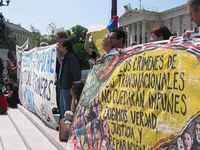Ruling of the Permanent People’s Tribunal
Session on Neoliberal Policies and European Transnational Corporations in Latin America and the Caribbean Lima, 13-16th May 2008
The Tribunal recognises the importance, difficulties and the inherent risks associated with the struggle of social movements, peasants, workers and indigenous people as well as other grassroots organisations. It also committed to continue using its competence and work to strengthen the definition of legal responsibility of MNCs and to denounce human rights violations of the local people by multinational corporations, States and international institutions and to find new alternatives.
1. To morally and ethically sanction as well as to denounce worldwide, the legal, political, economic, financial, production behaviour and practices of the neoliberal model implemented and permitted by the States and the European Union institutions, on the premise of promoting growth and economic development to fight poverty and obtain sustainable development;
2. To morally and ethically sanction, as well as to denounce on the international stage, multinational corporations with private and state capital from Europe, for serious, blatant and continuous violations of principles, norms, agreements and international accords protecting the civil, political, economic, social, cultural and environmental rights of the communities, nationalities, families, individuals and peoples of Latin America and the Caribbean;
3. To ask the United Nations Human Rights Council to designate a Special Rapporteur to present a report to the General Assembly within the shortest time possible, with a proposal to characterise the concepts of illegitimate, ecological and historical debts, as well as the definition of economic, social and cultural rights violations against individuals and villages by governments, financial institutions and multinational corporations. This should lead to the creation of an International Tribunal to judge economic and environmental crimes, where individual or collective victims can file a lawsuit;
4. To ask the governments and states of the European Union and their community organisations :
4.1 To make their international economic relations and their and their economic and international cooperation policy decisions binding, and conform to pre-eminent standards, guaranteeing and respecting conventions, international agreements, declarations and WTO norms on themes of basic rights, human development, democracy and environmental protection;
4.2 That their judicial system recognize the right to direct recourse before a justice tribunal and claim responsibility and reparation for eventual violations of rights by companies, public and private financial institutions, by illegal actions outside the national territories.
5. Demand that European multinational corporations and financial, international, commercial and private institutions, as well as private capital or state institutions abandon their double morals and commit to making an obligatory policy controlled by local citizens that primarily respects human rights; which is an international right;
6. To urge the States and governments of Latin America and the Caribbean to:
6.1 Guarantee -within the framework of cooperation and economic, commercial and business integration relations with the European Union- the sovereignty and dignity of the peoples before the economic interests of the private sector; to prevent the privatisation of basic living resources such as water, air, land, seeds, genetic heritage and to assure universal access to public services;
6.2 Assure fast and efficient access to justice and respect, and to assure the speedy enforcement of conventions, international agreements, declarations and WTO norms as well as human, environmental, and peoples', rights in general, as well as those of communities and indigenous nationalities;
6.3 Encourage and support the justice system in carrying out investigations and punishing crimes, particularly those committed in violation of peoples' and communities' right by using all necessary resources; thus obtaining full material and moral reparation for serious damages and prejudices carried out against many victims by violation of their rights;
6.4 Apply measures inspired by the internationally recognised principle of Free, Prior and Informed Consent of the social actors, local communities and indigenous peoples, as well as the principle of precaution, when they plan to enforce development and capital investment policies that can have negative effects on the land, living space and basic rights;
7. Having seen the importance and the significance of the demands for justice that have accompanied the presentations, which aims to encourage tribunals and operators of justice so that they develop the contents of the law and achieve effective laws; the tribunal agrees to send the file, ruling and recommendations to the employees of the following institutions for them to act with their competences, power and representatives:
- Public prosecutor of the International Penal Tribunal
- United Nations Economic and Social Council
- United Nations Human Rights Council and the competent Special Rapporteur on this matter
- The European Court of Human Rights
- Inter-American Commission on Human Rights
- Presidents of constitutional tribunals and courts, Public and Finance Ministers, and Defenders of the peoples of Latin America and the Caribbean
- Governments of member states and the European Commission
The Tribunal recognises the importance, difficulties and the inherent risks associated with the struggle of social movements, peasants, workers and indigenous people as well as other grassroots organisations. It also committed to continue using its competence and work to strengthen the definition of legal responsibility of MNCs and to denounce human rights violations of the local people by multinational corporations, States and international institutions and to find new alternatives.
François Houtart ( President, Belgium), Vilma Nuñez ( Vice President , Nicaragua), Miren Etxezarreta (Spain), Blanca Chancoso (Ecuador), Patricio Pazmiño (Ecuador), Giulia Tamayo (Peru), Francesco Martone (Italy), Roberto Schiattarella (Italy), Franco Ippolito (Italy), Edgardo Lander (Venezuela), Alirio Uribe (Colombia), Lorenzo Muelas (Colombia), Gianni Tognoni ( Secretary General TPP , Italy)

